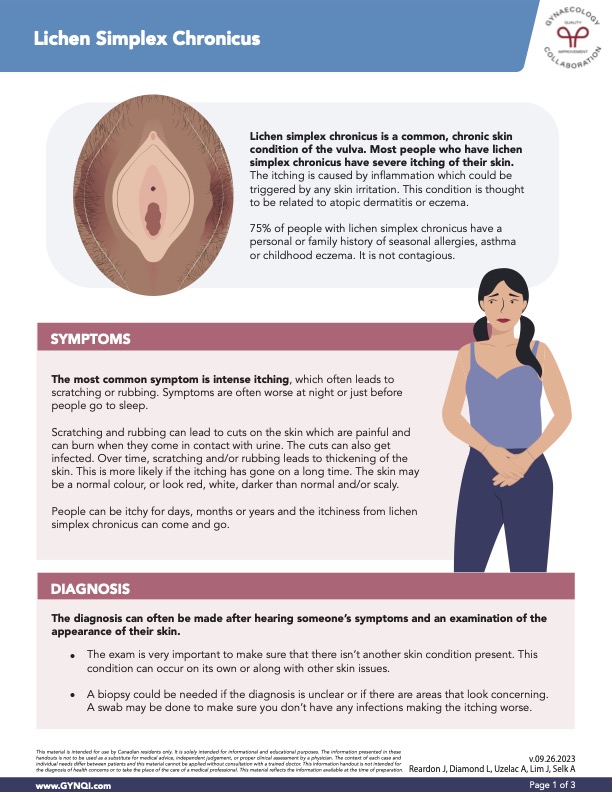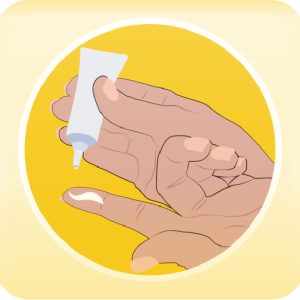
Table of Contents
- Summary
- What Causes Itching?
- Symptoms of Lichen Simplex Chronicus
- Breaking the Cycle
- Treatment of Lichen Simplex Chronicus
- Breaking the Itch-Scratch Cycle
- Avoiding Triggers
- Topical Steroids
- Vulvar Hygiene
- Ongoing Care
Summary:
- Lichen Simplex Chronicus is a persistent vulvar skin condition characterized by severe itching due to inflammation. It’s often linked to atopic dermatitis or eczema, and commonly affects those with a history of allergies or asthma.
- Intense itching can lead to scratching, which may worsen at night and create a cycle of irritation, potentially resulting in painful cuts, increased risk of infection, and if untreated–thickening of the skin.
- Effective management focuses on breaking the itch-scratch cycle through methods such as cool compresses, antihistamines, and topical steroids, while also identifying and avoiding triggers like tight clothing and scented products.
- It’s important to monitor for any new skin changes, such as warts, ulcers, or persistent cuts, and to consult a doctor if these arise. Maintaining proper vulvar hygiene and being mindful of irritants will also promote healing and comfort.
Lichen Simplex Chronicus is a common, persistent skin condition of the vulva, noted by severe itching due to inflammation from various skin irritations. Often linked to atopic dermatitis or eczema, up to 75% of those affected have a personal or family history of seasonal allergies, asthma, or childhood eczema. Lichen Simplex Chronicus is not contagious, but can be extremely uncomfortable–making this condition important to understand for effective management and relief.
What Causes Itching?
Lichen Simplex Chronicus tends to follow a pattern. It can start simply when clothing or other irritants rub or scratch the skin, leading to itching. Over time, as the person scratches the area for relief, the skin thickens, which causes more itching and further scratching, creating a cycle of irritation and thickening.
Symptoms of Lichen Simplex Chronicus
Lichen Simplex Chronicus is a chronic skin condition characterized by intense itching of the vulvar skin that can significantly impact daily life. This persistent itch often leads to scratching, which can cause further skin complications and discomfort. Understanding and managing this condition is essential for those affected.
Intense itching: This often leads to scratching or rubbing, with symptoms typically worsening at night or just before sleep. Scratching and rubbing can cause painful cuts that can burn on contact with urine. Cuts may also lead to infection.
Skin conditions: Prolonged scratching can lead to thickening of the skin, and is more likely if the itching has occurred for a long time. Vulvar skin can look normal, or appear red, white, darker than normal, or scaly.
Symptoms can last for days, months, or years, and the itchiness from Lichen Simplex Chronicus can come and go.
Breaking the Cycle
Intense itching from Lichen Simplex Chronicus often leads to scratching, which provides temporary relief but also triggers histamine release, causing more itching. Many individuals may also scratch unconsciously during sleep, worsening the condition.
Talk to your doctor about your treatment options. Breaking the cycle of itching is key to maintaining the condition.
Treatment for Lichen Simplex Chronicus
There are a few different approaches to helping manage the symptoms of Lichen Simplex Chronicus. Treatment starts with focusing on breaking the itch-scratch cycle and soothing the affected skin. Other treatment options can include topical treatments, lifestyle modifications, and addressing any underlying conditions.
Breaking the Itch-Scratch Cycle
This is your first defense in managing Lichen Simplex Chronicus. Instead of scratching, use a cool compress, or an ice pack wrapped in cloth to protect your skin. Your doctor may suggest antihistamines for nighttime relief, and keeping your nails short can help prevent accidental irritation.
Avoiding Triggers
At first, it might be hard to pinpoint an exact trigger. Your doctor may suggest avoiding these potential irritants to start:
- Heat and excessive sweating
- Tight clothing and underwear
- Topical products and wipes
- Shaving and waxing
- Pads and pantyliners
- Scented products
- Soaps and bubble baths
- Douching
- Condoms and certain lubricants
Topical Steroids
A steroid ointment may be your best bet to decrease inflammation and help break the itch-scratch cycle. Generally prescribed for 4-8 weeks after diagnosis, when used as directed topical steroids are very safe, and it’s common to continue to use them for short periods if symptoms recur. If topical steroids aren’t working for you, your doctor may prescribe a calcineurin inhibitor.
Vulvar Hygiene
In order to avoid irritants, it’s a good idea to take stock of potential triggers in your everyday hygiene products and practices.
General hygiene tips include:
- Wear cotton underwear and go without underwear at night
- Trim pubic hair instead of shaving or waxing
- Use tampons, or cotton/hypoallergenic pads
- Moisturize with petroleum jelly or coconut oil
- Wash your vulva with water alone or non-soap cleansers
- Wash gently with fingers only and pat dry
- Use warm water (not hot) in the shower and bath
- For lubricants, use hypoallergenic silicone or water-based options for intercourse
Ongoing Care
Lichen Simplex Chronicus can occur on its own or along with other vulvar skin conditions. It is not associated with an increased risk of cancer or other long-term problems, and your doctor will likely see you a few times to check your symptoms are improving.
After your diagnosis, be mindful of your vulvar care. Continue to avoid triggers and use any prescribed steroid ointment as needed for short periods of time. Talk to your doctor if you notice any new skin changes like warts, ulcers, new dark spots, white spots, or cuts that don’t heal.
By recognizing potential irritants and following prescribed treatment strategies, you can break the cycle of pain and irritation for a happier, healthier vulva.


